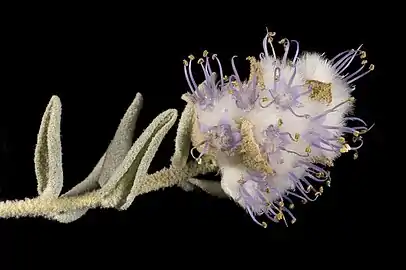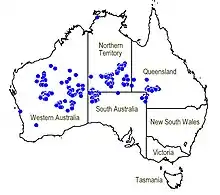Newcastelia cephalantha
Newcastelia cephalantha is a species of plant belonging to the mint family, Lamiaceae,[3] and native to several Australian states: Queensland, South Australia, Western Australia and the Northern Territory[4]
| Newcastelia cephalantha | |
|---|---|
 | |
LC (TPWCA)[1] | |
| Scientific classification | |
| Kingdom: | Plantae |
| Clade: | Tracheophytes |
| Clade: | Angiosperms |
| Clade: | Eudicots |
| Clade: | Asterids |
| Order: | Lamiales |
| Family: | Lamiaceae |
| Genus: | Newcastelia |
| Species: | N. cephalantha |
| Binomial name | |
| Newcastelia cephalantha | |
 | |
| Occurrence data from ALA | |
Description
Newcastelia cephalantha is a many branched shrub, growing from 0.3 to 1.2 m high on red sandy soils, on dunes and sandplains. It flowers from June to October with white/purple flowers.[5]
Distribution
In the Northern Territory it is found in the IBRA regions of Burt Plain, Central Ranges, Channel Country, Davenport Murchison Ranges, Finke, Great Sandy Desert, Great Victoria Desert, MacDonnell Ranges, Simpson Strzelecki Dunefields, and Tanami.[1]
In Western Australia it is found in the IBRA regions of Pilbara, Little Sandy Desert, Gascoyne, Central Ranges, Gibson Desert, Great Sandy Desert, Great Victoria Desert and Murchison.[5]
Propagation
Take the tips from the current season's growth from actively growing plants. Transport wrapped in wet newspaper in a sealed plastic bag, and preferably refrigerated. Trim cuttings to 5–10 cm in length and dip in rooting hormone. Use intermittent mist and bottom heat. However, the strike rate is poor.[1]
References
- NT Flora (Flora of the Northern Territory): Newcastelia cephalantha. Retrieved 21 June 2019.
- Mueller, F.J.H. von (1875) Fragmenta Phytographiae Australiae 9(72): 4. Retrieved 21 June 2019
- "Newcastelia cephalantha". Australian Plant Name Index (APNI), IBIS database. Centre for Plant Biodiversity Research, Australian Government.
- Govaerts, R. et. al. (2019) Plants of the world online: Newcastelia cephalantha. Board of Trustees of the Royal Botanic Gardens, Kew. Retrieved 21 June 2019.
- "Newcastelia cephalantha". FloraBase. Western Australian Government Department of Parks and Wildlife.
External links
- Newcastelia cephalantha Occurrence data from the Australasian Virtual Herbarium
 Media related to Newcastelia cephalantha at Wikimedia Commons
Media related to Newcastelia cephalantha at Wikimedia Commons